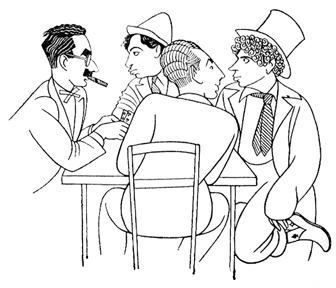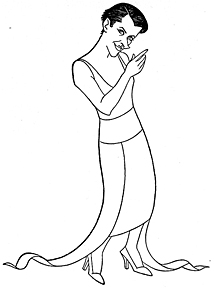In this chapter from his 1932 book, Times Square Tintypes, Broadway columnist Sidney Skolsky profiles the Marx Brothers.
AH, NUTS!
THE MARX BROTHERS. They are known as Groucho, Harpo, Chico and Zeppo. Their real names are Julius, Arthur (formerly Adolph), Milton (editor’s note: Skolsky got this wrong: Chico’s real name was Leonard; it was Gummo who was named Milton) and Herbert. They were given their nicknames by a kibitzer at a poker game in Galesburg, Ill.
Three of them are married. Harpo, the unmarried one, has been on the verge of eight times. With eight different girls.
Have been known as “The Three Nightingales,” “The Four Nightingales,” “The Six Mascots” (in this act they were assisted by their mother and their other brother, Gummo, now in the cloak and suit business), and “The Four Marx Brothers.” The name of the act depended on how many of the family were in it.
Are nephews of Al Shean of Gallagher and Shean fame.
Groucho’s theatrical career started at the age of thirteen in a Gus Edwards “School Days” act. He was fired in the middle of the tour because his voice changed.
Harpo’s debut was made twenty-two years ago on a Coney Island stage. He was pushed on when “The Three Mascots” were playing there. He wore a white duck suit with a flower in his buttonhole. Frightened, he stood with his back to the audience an didn’t say a word until the curtain fell. Has yet to speak a word on the stage. After his début “The Three Mascots” was changed to “The Four Nightingales.”
After finishing a sandwich at a party, Groucho throws the plate out the window.
Chico is the business member of the quartet. It was he who arranged for their first appearance in a Broadway show.
Harpo was once a bellboy at the Hotel Seville. He earned an extra twenty-five cents a week from Cissie Loftus for taking her dog for a daily stroll. Chico played the piano in nickelodeons. Groucho drove a grocery wagon in Cripple Creek, Col. He had a burning desire to become a prize fighter.
Whenever they want to get out of an engagement Harpo fakes an appendicitis.
Their dressing room is always filled with visitors. Herbert Swope, Neysa McMein, Harold Ross, Alexander Woollcott, Heywood Broun and Alice Duer Miller are nightly visitors when they have a show in town.
Chico will bet on anything. Merely say it is a nice day and he will say: “I’ll bet you.”
Harpo’s and Zeppo’s favorite dish is crab flakes and spaghetti. Groucho and Chico, on the other plate, are especially fond of dill pickles and red caviar.
The four of them play the stock market. That’s why they’re still in the show business.
Whenever Groucho wants to visit his broker he tells his wife he is going to play golf. He visits his broker attired in a golf outfit, carrying a bag of clubs.
Are always playing practical jokes. Annoy interviewers by pretending they are slightly deaf. Another gag is Groucho telling their life story. He stops at a certain point saying: “This is all I remember of my life. Chico knows the rest.” Chico continues with an entirely different story. He also stops in the middle, offers the same excuse, referring the interviewer to Zeppo, who continues the process until all four have told a different story of their lives.
Offstage Groucho, Chico and Zeppo occasionally wear glasses.
Zeppo is in the real estate business. He tries to sell property backstage.
Harpo is the best poker player of The Thanatopsis Club. Has won enough money from Heywood Broun to pay for young Heywood’s tuition fee through any college in the country. Is also a great croquet player. Often plays in Central Park for a thousand dollars a game.
Their grandfather was a noted strolling German magician. Their grandmother was also in the act. She played the “accompanying music” on a harp.
They failed to click only once. In a London Music Hall. The Englishmen booed and threw pennies on the stage. Groucho stepped to the footlights and told them they were cheap. He dared them to throw shillings. They made more money at the performance than they were paid for the week.
To Harpo every woman, regardless of her name, is Mrs. Benson.
Harpo can play any musical instrument. Chico plays the piano and harp. Groucho plays the guitar. Zeppo likes to listen to the radio.


